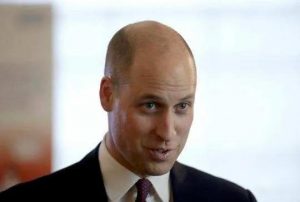
If you had to make a choice between baldness and obesity, which one would you choose?
Better be fat than bald! I can’t lose weight anyway
And these days, a beautiful black hair is also a capital to show off!
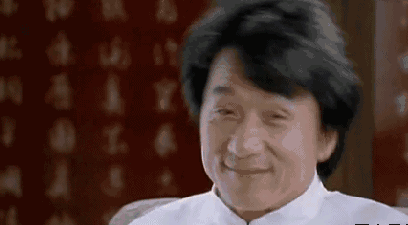
However, the reality is more cruel than we think.
Recently, Japanese scientists published a study in Nature
Obesity can accelerate hair loss.
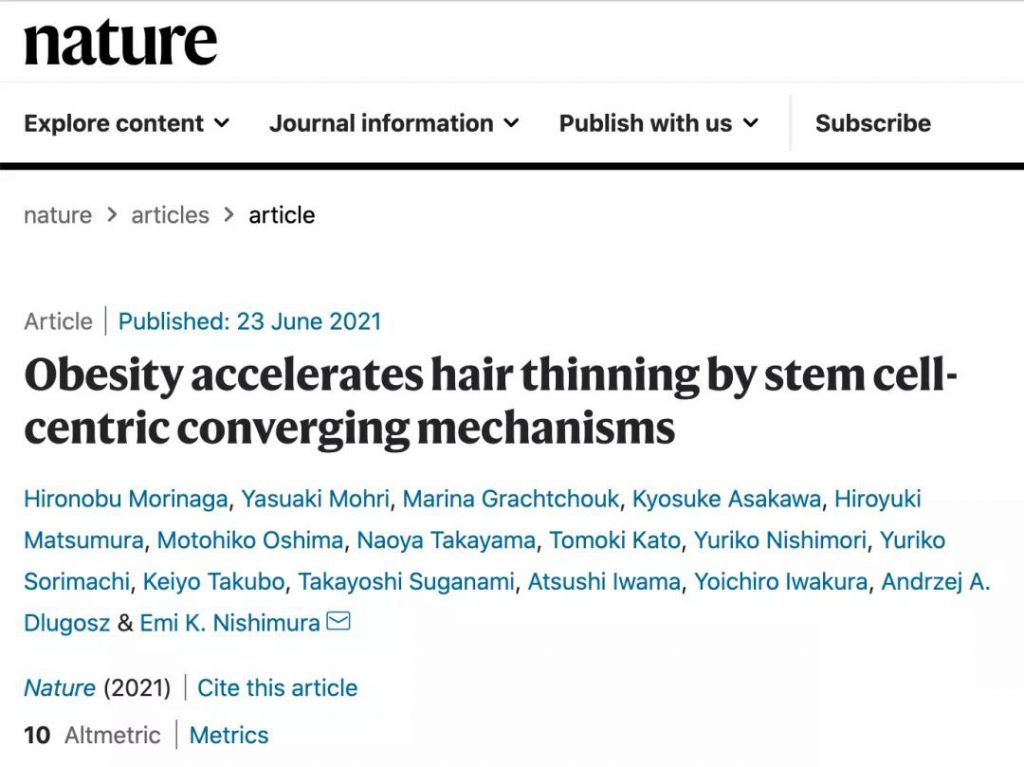
Researchers have shown in mice that long-term consumption of high-fat food can accelerate hair loss.
And unlike the androgenic alopecia mechanism, obesity accelerates alopecia regardless of gender.
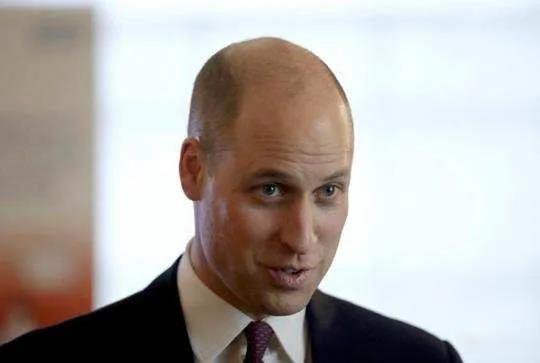
This means that every bite of meat you have may give away your hair.
From then on, besides being weak and helpless but having a good appetite, I’m afraid I’ll add another word and being bald.
If you eat too much, there will be less hair follicles
As two problems on the contemporary people: obesity & hair loss, the relationship between them has always been ambiguous.
Previous studies have shown that obesity is a risk factor for androgen alopecia, but whether it will really have an impact is still unknown.
To this end, scientists from Tokyo Medical and Dental University stem cell biology used mice to do the verification.
They fed the mice normal and high-fat diets to see how their hair changed.
The results are extremely frightening
In the aged mice (20 months old), only one month of continuous intake of high-fat food, hair has appeared obvious signs of shedding.
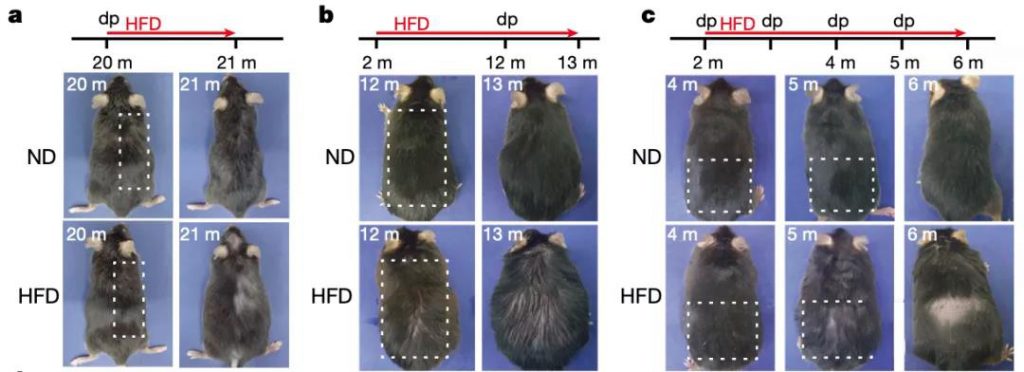
Nd (normal diet) was the control group, HFD (high fat diet) was the high fat diet group.
In the young mice (2 months old) with vigorous hair growth, the mice were still bald after feeding high-fat food for several months.
And the hair gets softer.

The mice in △ HFD group were fat and bald
From the appearance, that obesity can lead to hair loss is real.
What is the specific mechanism?
This is from the source of hair – hair follicles to find the answer.
The reason why hair can grow and renew all the time is mainly due to the periodic proliferation and differentiation of hair follicle stem cells (hfscs).
Under normal circumstances, hair follicle stem cells can differentiate into epidermis, hair follicle and sebaceous gland, which is the headquarters of hair growth.
However, when hair follicle stem cells are too few or fail, the hair becomes sparse.
From this point of view, the researchers observed the hair follicles of mice.
Only 4 days after the mice were fed with high-fat food, hfscs produced excessive reactive oxygen species and developed into epidermal keratinization.
After long-term feeding, the number of hair follicle stem cells will be reduced.
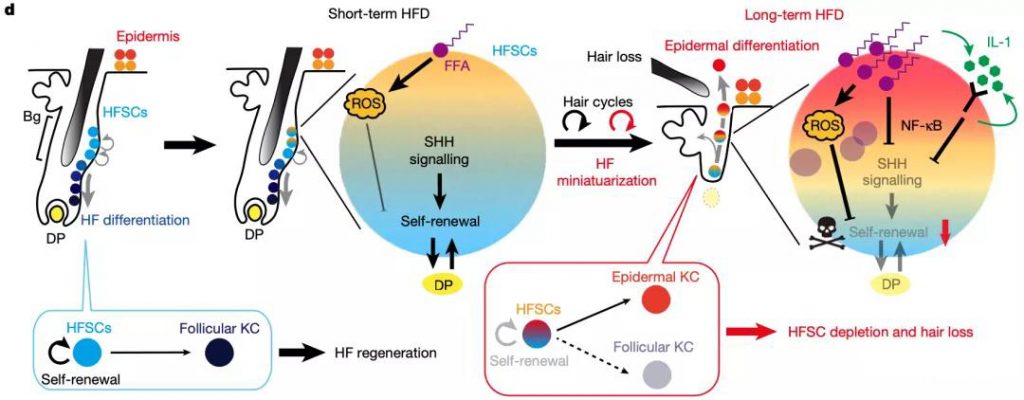
The above image shows the hair follicle image of mice. The arrow indicates that no hair follicle containing hfscs bulge is detected.
And the fatter the mice were, the more hair follicle stem cells they lost
In addition, the researchers found that their hair follicle stem cells were more concentrated in the upper layer than in normal mice.
This leads to more differentiation of hfscs into epidermis or sebaceous glands rather than hair regeneration.
The reason why hair follicle stem cells have such changes is that obesity can inhibit the SHH signal that affects its differentiation.
SHH signal is a protein which plays an important role in regulating the differentiation of animal cells.
In mice fed high fat food for a long time, Shh signal channel was not fully activated, which led to abnormal differentiation of hair follicle stem cells.
In the long run, mouse hair follicles will gradually become smaller, eventually leading to hair loss.
After the researchers activated Shh channel with drugs or transgenic technology, the hair loss of mice was significantly improved.
Finally, these phenomena and data show that obesity can induce the failure of hair follicle stem cells.
It has certain enlightenment significance for people to study the relationship between obesity and aging; It also makes stem cell research a new possibility for the prevention and treatment of various senile diseases.
The study was jointly carried out by Professor EMI Nishimura, Department of aging and regenerative biology, Institute of Medical Sciences, Tokyo University, and assistant professor Hironobu Morinaga, Department of stem cell biology, Tokyo Medical and Dental University.
Netizen: very unfriendly to the overworked and fat doctor!
Although this is only an experiment on mice, we have already felt fear…
Not only fat, but also bald. Nobody can bear it.
After seeing the results of the research, netizens sighed:
Obesity already makes me sad. Being bald makes it worse.
As a group with a high incidence of baldness and obesity, the grief has become even greater for doctors!
This is not friendly to overworked doctors at all!
The clear minded fat man has realized at this moment: the great cause of weight loss must be brought up again!
Keeping on diet and doing exercise can not only prevent obesity but also baldness.
Comments